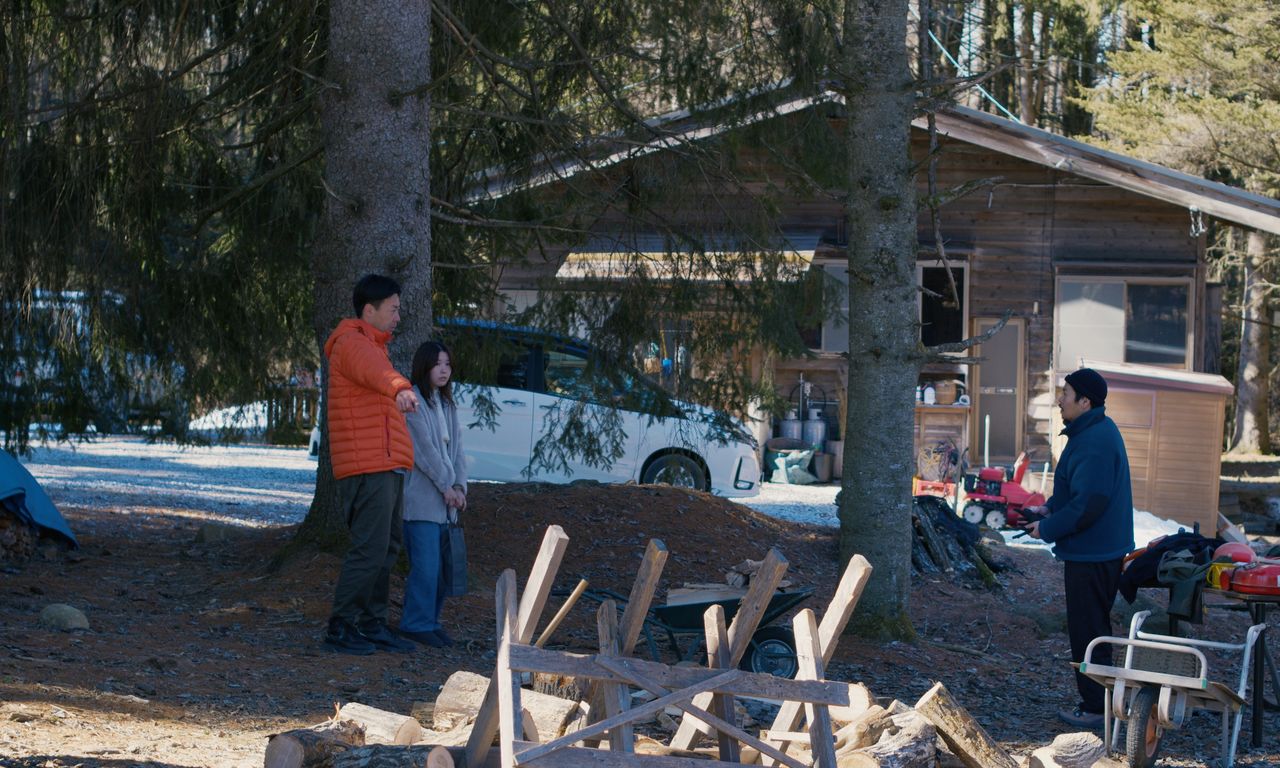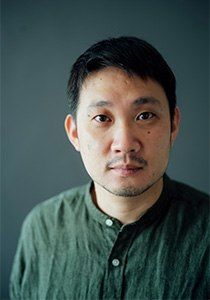
Director Hamaguchi Ryūsuke on Film Ethics, Creativity, and “Evil Does Not Exist”
Society Cinema- English
- 日本語
- 简体字
- 繁體字
- Français
- Español
- العربية
- Русский
“A Chance to Depict Something Near”
“‘Nature’ isn’t a common motif for me,” says director Hamaguchi Ryūsuke when asked about the themes in his acclaimed 2023 outing, Evil Does Not Exist. “It probably turned up this time because the original idea was to make some visuals for Ishibashi’s music.”
The story began when the composer Ishibashi Eiko, who scored Hamaguchi’s previous work Drive My Car, asked Hamaguchi for some moving images she could use in her live performances. It wasn’t clear to Hamaguchi how he should proceed at first, but after some trial and error he decided to make a film “in the usual way”: writing a full script, having it performed, and shaping this into visuals for live performance.
The result was Evil Does Not Exist—and, for Ishibashi’s live performances, the silent film Gift.
Evil Does Not Exist is set in Mizubiki, a fictional town in Nagano Prefecture set amid natural beauty, yet conveniently close to Tokyo. Life in Mizubiki is disrupted when a Tokyo-based talent management agency, struggling with the COVID-19 pandemic and eager to take advantage of government subsidies, hits on the idea of building a luxury glamping site there. The agency sends two representatives to Mizubiki to explain their proposal to local residents, who see the project as an unacceptable risk to the local environment and their way of life.
Hamaguchi hit on the idea for the story during scriptwriting a research trip to Ishibashi’s base of operations on the Nagano-Yamanashi border. While visiting, he heard local residents discussing a plan to build a glamping site and their take on a recent meeting to explain the proposal.
“What I heard made me feel I had a chance to depict something near to the world we live in,” says Hamaguchi. “The film’s version of the meeting closely parallels what happened in reality, and there were similar attempts to blithely push the forward project over objections from residents who saw the proposal as slapdash and careless. I understand that the real project didn’t get beyond that point, but similar things happen in my own living space—for example, the film industry, where I work.”
The film’s narrative centers on four characters: Takumi, a taciturn young resident of Mizubiki; Hana, his daughter; and Takahashi and Kaoru, who are sent from the talent agency to work on the glamping site.
“I wanted to dramatize the relationship between nature and humanity,” says Hamaguchi, “and I thought it would have more reality if I mixed in some depictions of the way city-dwellers treat nature as something to consume, rather than showing only how Takumi and his daughter relate to the natural world.”

Ōmika Hitoshi, who plays Takumi, was originally Hamaguchi’s driver during his research trip. Hamaguchi later offered him the lead role in the film. (© 2023 Neopa/Fictive)
After an extended research period, the director finally completed his script in January 2023. Its characters have motives that intertwine and, at times, move at cross-purposes, driving the story in directions that completely overturn viewer expectations.
“What I aim to create is an accumulation of personal principles,” says Hamaguchi. “When all the characters obey their own principles and you carefully consider and follow the logic of what each of them would or wouldn’t do, it reinforces the fictional world. Some of the background is known only to me, and I don’t mean to convey all of it to the audience, but I did write a script that satisfies me and makes me think, ‘This world is like this.’”
The same applies to humor. There are scenes and situations where laughter comes unbidden, but Hamaguchi does not try to make the audience laugh as such.
“Fundamentally, you can’t control your audience’s reaction, and not everything will reach them the way you intend. I simply string together events based on what each character would say or do at that point. This has often inspired laughter at film festival screenings over the past decade or so, but that means that people are engaging with the work amicably, so I’m grateful for that!”
Questioning the Norms and Ethics of Society
Hamaguchi’s works often use romance and sex to reexamine ethics and good and evil in human society. Recent works like Asako I & II (2018) and Wheel of Fortune and Fantasy (2021) take an especially direct approach to this. Evil Does Not Exist is squarely in this tradition, taking a different approach but nevertheless pursuing the same ethical questions through its narrative. Even the title suggests this.
However, Hamaguchi describes the title as “another way to express the motif of nature,” stating that he did not mean it to point directly to ethical quandaries or problems of good and evil.
“Ethics and social norms cannot fully accommodate the individual human being. However much an individual may long to be ethical, I believe there will always be times in their life when these apply, and times when they don’t. That’s why, even looking beyond my films, there aren’t many works at all that depict people only when they are imprisoned by ethics and norms. Even if such works did exist, I wouldn’t have much interest in them.”
Hamaguchi is also skeptical of the true nature of “society” as something underlying ethics and norms. “What we think of as society is nothing more than what the mass media tells us ‘This is what society is like,’” he says. “That’s exactly why people try to avoid their information diet becoming skewed by seeking out multiple sources: newspapers, magazines, the internet, social media, and so on. Ultimately, you end up with something ‘vaguely society-ish’; whether it’s society or not, you do not know. Social media networks in particular, which use algorithms to make users spend more time on them, are becoming extremely poor sources of information for learning about society. The important thing is to live your life aware that, while everyone has something they conceive of as ‘society-ish,’ those concepts are in reality very different from each other.”

The relationship between the two talent agency employees and Takumi evolves over time. (© 2023 Neopa/Fictive)
Back and Forth Between Large- and Small-scale Movies
After Drive My Car, with its cast of stars like Nishijima Hidetoshi, Miura Tōko, and Okada Masaki, Evil Does Not Exist represents a return to Hamaguchi’s roots in independent cinema. The two full-length films are very different in scale and direction, but Hamaguchi reports little difference between his motivation and approach to the work in both cases.

Exquisite natural scenery almost becomes another character. (© 2023 Neopa/Fictive)
After this experience of a return to film-making origins, Hamaguchi intends to continue producing both commercial films and smaller-scale works.
“Working on both big sets and small sets feels better for my mental health. Each has its own distinct advantages, and being able to synthesize the two is the ultimate ideal. At the moment I’m experimenting to see how far I can expand the scale without losing the smooth communication that a small team makes possible.”
Hamaguchi has received an Academy Award as well as prizes at the three major global film festivals in Cannes, Venice, and Berlin—an achievement unrivaled by any Japanese director since Kurosawa Akira. He also hopes to make a film outside Japan one day.
So, as global critical interest rises, how has the pressure on his creative process changed? “To begin with, I want to get better at shooting,” he replies frankly. “If I could find a good way to bring about interactions between the pressure bearing down on me with simple desires like that, there’d be no problem. That’s exactly why I think it’s important to always go where my heart urges, in the direction that excites me.”
Trailer (Japanese)
(Originally published in Japanese on April 26, 2024. Banner photo: Director Hamaguchi Ryūsuke’s new full-length film Evil Does Not Exist. © 2023 Neopa/Fictive.)


